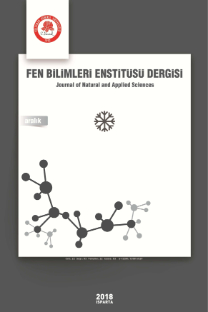Yazılım Pratisyenlerinin Analitik ve Mantıksal Düşünme Becerilerini Değerlendirmek için Oyunlaştırma Perspektifi Kullanan Eksploratif Bir Çalışma
An Exploratory Study to Assess Analytical and Logical Thinking Skills of the Software Practitioners using a Gamification Perspective
___
- Tomal, D. R. 2010. Action research for educators. Rowman & Littlefield Publishers. USA, 214p.
- Oliva, J. M. 2003. The Structural Coherence of Students’ Conceptions in Mechanics and Conceptual Change. International Journal of Science Education, 25.5(2003), 539‐561.
- Linstone, H. A., Turoff, M. (Eds.). 1975. The Delphi method: Techniques and applications. Addison‐Wesley, USA, 640p.
- Saekman, H. 1975. Delphi Critique: Expert Opinion. Lexington Books, MA, USA, 77p.
- Castaneda. M. Anthony. 2011. Including People With Disabilities In Disaster Preparedness: A Delphi Study, Pepperdine University, Doctoral dissertation, 142p, California.
- Tseng. Yen Hua‐Hui. 2008. Motivation Of Participation In Inservice Training Based On Problem Solving: A Modified Delphi Study, University Of Phoneix, Doctoral dissertation, 409p, Arizona.
- Gray, C. J. 2014. Electronic Health Record System In A Centralized Computing Services Environment: Critical Success Factors For Implementation, Robert Morris University, Doctoral dissertation, 209p, Pennsylvania.
- Jordan, E. A. 2010. The Semiconductor Industry And Emerging Technologies: A Study Using A Modified Delphi Method, University of Phoenix, Doctoral dissertation. 184p, Arizona.
- Dalkey, N., Helmer, O. 1963. An experimental application of the Delphi method to the use of experts, Management science, 9.3(1963), 458‐ 467.
- Krueger, R.A. 1998. Analyzing and reporting focus group results. Thousand Oaks, CA: Sage. 160p.
- Baltaş, Zuhal, 2003. ‘Yaptık’ Demekle Olmuyor Yetkinlik Belirlemede Kullanılan Yöntemler. http: //www.pazarlamadunyasi.com (Retrieved Date: 24.04.2015).
- Herranz, E., Colomo‐Palacios, R., de Amescua Seco, A., Yilmaz, M. (2014). Gamification as a disruptive factor in software process improvement initiatives. Journal of Universal Computer Science, 20.6 (2014), 885‐906.
- Tobin, K. G., Capie, W. 1981. The development and validation of a group test of logical thinking. Educational and Psychological Measurement, 41.2 (1981), 413‐423.
- Aysun, U., Arıol, Ş., 2011. Baskın Olarak Bütüncül Stilde Düşünenlerle Baskın Olarak Analitik Stilde Düşünenlerin Problem Çözme Davranışlarının Karşılaştırılması, Pamukkale Üniversitesi Eğitim Fakültesi Dergisi, 30.2 (2011), 27‐37.
- Mohd Suki, N., Mohd Suki, N. 2007. Mobile phone usage for m‐learning: comparing heavy and light mobile phone users. Campus‐Wide Information Systems, 24.5 (2007), 355‐365.
- Bogost, I. 2007. Persuasive games: The expressive power of videogames. London. MIT Press, USA, 432p.
- Hou, J. 2011. Uses and gratifications of social games: Blending social networking and game play. http://journals.uic.edu/ojs/index.php/fm/articl e/view/3517/3020 (Retrieved Date: 20.04.2015).
- Bunchball, I. 2010. Gamification 101: An Introduction to the Use of Game Dynamics to Influence Behavior, White paper, 14p.
- Deterding, S., Sicart, M., Nacke, L., O'Hara, K., Dixon, D. 2011. Gamification. Using game‐design elements in non‐gaming contexts. In CHI'11 Extended Abstracts on Human Factors in Computing Systems, 2425‐2428.
- Zicherman, G., Cunningham, C. 2011. Gamification by Design: Implementing Game Mechanics in Web and Mobile Apps. 1st ed. Sebastopol, O'Reilly Media, California, USA, 208p.
- Domínguez, A., Saenz‐de‐Navarrete, J., De‐ Marcos, L., Fernández‐Sanz, L., Pagés, C., Martínez‐Herráiz, J. J. 2013. Gamifying learning experiences: Practical implications and outcomes. Computers & Education, 63(2013), 380‐392.
- Kaya Z. 2006. Öğretim teknolojileri ve materyal geliştirme. Pegem Yayıncılık. Ankara, 473p.
- Prensky, M. 2002. What kids learn that's positive from playing video games? http://www.marcprensky.com/ (Retrieved Date: 15.04.2015).
- McGonigal, J. 2011. Reality is Broken: Why Games Make Us Better and How They Can Change the World, Penguin Books, USA, 416p.
- Zicherman, G. Linder, J. 2010. Game‐Based Marketing: Inspire Customer Loyalty Through Rewards, Challenges, and Contests. John Wiley & Sons, USA, 220p.
- Robbins, Joanne K. 2011. Problem solving, reasoning, and analytical thinking in a classroom environment. The Behavior Analyst Today 12.1 (2011), 40‐47.
- Fatin, A.P., Mohamad, B.A., Bakar, M.N., Noor, F.A.R., Lilia, E.M., Normah, M.G. 2011. Engineering elements profile among first‐and final‐year engineering students in Malaysia. IEEE Global Engineering Education Conference (EDUCON) April 4‐6, 2011, Amman, Jordan, 70‐ 73.
- Chuah, H. C. 2009. Building the past, engineering the present, educating the future. Journal‐The Institution of Engineers, Malaysia, 2.71(2009), 1‐4.
- Ruskin. 2011. Anglia Ruskin Üniversitesi tarafından üniversite öğrencileri için hazırlanmış rapor. http://www.kritik‐ analitik.com/ (Retrieved Date: 15.02.2015).
- Sternberg, R. J., Torff, B., Grigorenko, E. 1998. Teaching for successful intelligence raises school achievement. The Phi Delta Kappan, 79.9(1998), 667‐669.
- Gabel, D. L. 1993. Handbook of Research on Science Teaching and Learning Project. Macmillan Publishing Company, New York, USA, 598p.
- Karamustafaoğlu, S., Yaman, S. 2006. Öğretmen adaylarının mantıksal düşünme becerileri ve kimya dersine yönelik tutumlarının incelenmesi. Erzincan Eğitim Fakültesi Dergisi, 8(2006), 91‐106.
- Lipman, M. 2003. Thinking in education. Cambridge University Press. 318p.
- Özçelik, D. A. ed. 2012. İnsan nitelikleri ve okulda öğrenme. Pegem Akademi. Ankara, 320p.
- Jacobsen, D.A., Eggen, P., Kauchak, D. 2002. Methods for Teaching, Promoting Student Learning. Sixth Edition, Meririll Prentice Hall, New Jersey, USA, 416p.
- Kreber, C. 1998. The relationships between self‐ directed learning, critical thinking, and psychological type, and some implications for teaching in higher education. Studies in Higher Education, 23(1998), 71‐86.
- ISSN: 1300-7688
- Yayın Aralığı: 3
- Başlangıç: 1995
- Yayıncı: Süleyman Demirel Üniversitesi
DUYGU ARUĞASLAN ÇİNÇİN, Nur CENGİZ
Structural Modelling and Structure‐Function Analysis of Zymomonas mobilis Levansucrase
Bahar BAKAR, BURCU KAPLAN TÜRKÖZ
Cihat BOYRAZ, Murat ERDEM, Yalçın URFA
Demineralizasyon İşleminin Linyitlerin CO2 ile Gazlaştırılmasına Etkisi
Pınar ACAR BOZKURT, Zarife MISIRLIOĞLU, Sibel KOÇ, Muammer CANEL
Effect of Demineralization Process on the CO<sub>2</sub> Gasification of Lignite
Pınar ACAR BOZKURT, Sibel KOÇ, Muammer CANEL, Zarife MISIRLIOĞLU
Isparta Güneyindeki Tersiyer Kaya Birimlerinin Petrol Olanaklarının Araştırılması (GB‐Türkiye)
İbrahim İbrahim ABUBAKAR, FUZULİ YAĞMURLU
Integrable G<sub>2</sub> Structures on 7-dimensional 3-Sasakian Manifolds
7 Boyutlu 3-Sasaki Manifoldları Üzerinde ˙Integrallenebilir G2 Yapılar
